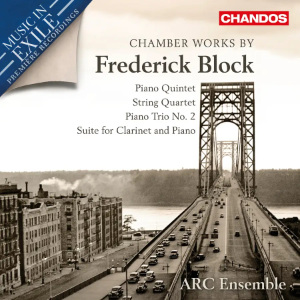
Frederick Block (1899-1945)
Piano Trio No.2, Op.26 (1930)
String Quartet, Op.23 (1928-1930)
Suite for Clarinet and Piano, Op.73 (1944)
Piano Quintet, Op.19 (1929)
ARC Ensemble
rec. 2023, Koerner Hall, TELUS Centre for Performance and Learning, Royal Conservatory of Music, Toronto, Canada
Chandos CHAN20358 [70]
Frederick Block, born in Vienna as Friedrich Bloch, studied with Josef Bohuslav Foerster in the city and, after him, with Hans Gál. He won modest successes over the next two decades and some of his chamber music, and then operas, were performed there – he wrote, apparently, six operas in four years – but the Anschluss hit and he left Austria for Britain and then, in June 1940, America. From 1943 he ‘was living the life of a houseplant’, a friend said, and seldom left his apartment and he died in 1945 of cancer, at the age of forty-five.
This disc of his chamber music is the latest in Chandos’s ‘Music in Exile’ series and performed, as ever, by the ARC Ensemble, a distinguished Canadian group. They perform four of Block’s pieces, one of which dates from his truncated American exile. Block was a conservative composer working within established parameters, but his music teems with lyricism and is well worth this restoration not least because none of the music has been recorded before. The Piano Trio No.2 of 1930 is a work of almost effusive lyricism with a very brief Scherzo – the instruction ‘noch schneller’ is faithfully observed – and a Korngoldian lied of an Adagio, affecting and luscious. The sparkling finale has time for a brief Tango, and a lot of whipped cream, generating a spontaneous, exciting quality.
Shortly before the trio, he composed a String Quartet cast on a rather wider canvas. It too is tuneful and approachable in the best Viennese style. Again, it sports a brisk Scherzo – something of a speciality of his, compressed scherzos – and an Allegretto that has a rather antique feel. It’s playful and charming. The finale gathers up elements of earlier thematic material and presents a wholly communicative conclusion. Around the time of these works he also managed to squeeze in the composition of a Piano Quintet, in three movements this time. The opening movement is zippy and avuncular, whilst the central one has more of that perfumed lyricism familiar from the chamber music of Kreisler and Korngold. The amiability of this, its lilting and insinuating warmth, reflects a light-hearted musical spirit as well as a highly competent control of material, something reinforced in the vivacious and congenial finale.
The final work is the 1944 Suite for clarinet and piano, for which Joaquin Valdepeñas is the clarinettist and Kevin Ahfat the pianist. In five pithy, perky movements it takes in some mild Spanishry, a pastoral, and a Fugue whilst the longest movement is an Orientale, with an angular central section surrounded by dreamy curlicues.
All the works are beautifully performed and the recording has been splendidly balanced. The director of the ensemble, Simon Wynberg, he has contributed the customarily fine booklet notes, to which I’m indebted for all biographical details. Block seems to have been a composer with nothing much to prove. He is lyric, occasionally puckish, always professional. That said, I can’t always detect real personality in his writing but perhaps I’ve not lived long enough with it.
Jonathan Woolf
Buying this recording via a link below generates revenue for MWI, which helps the site remain free




















